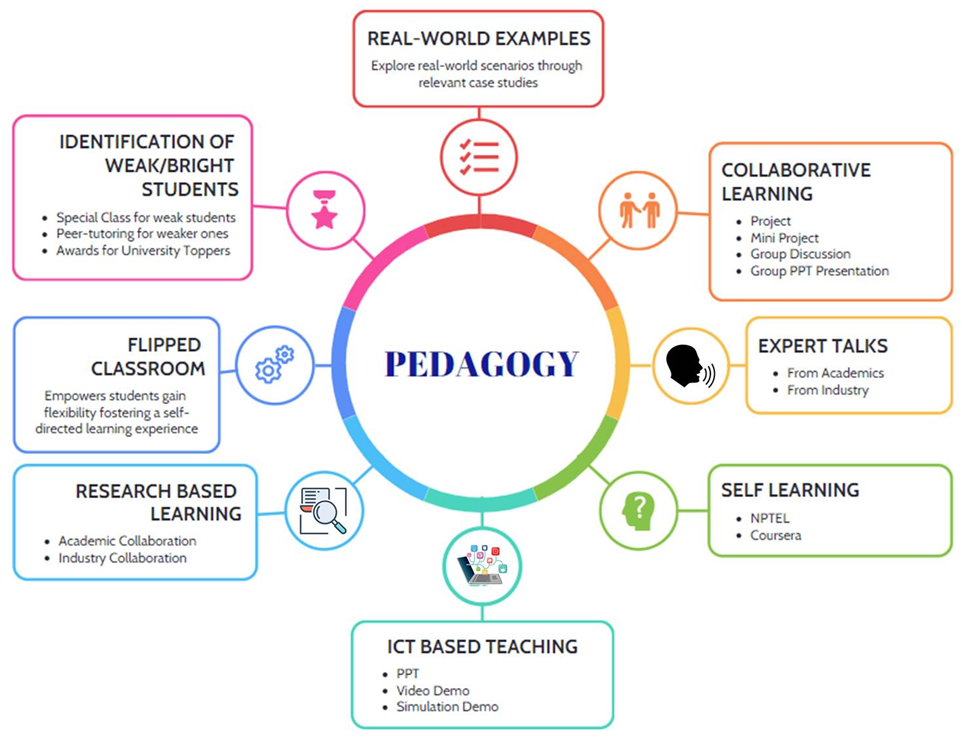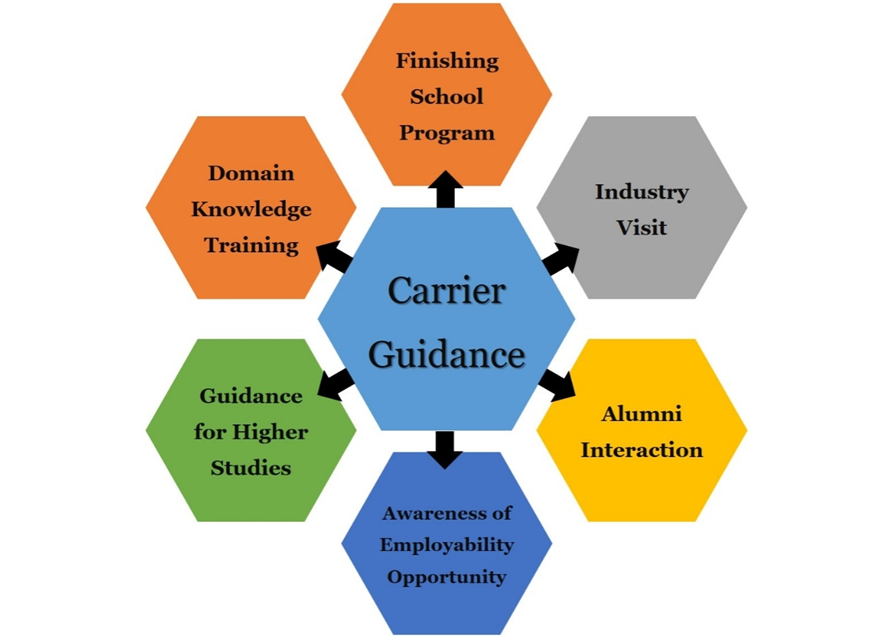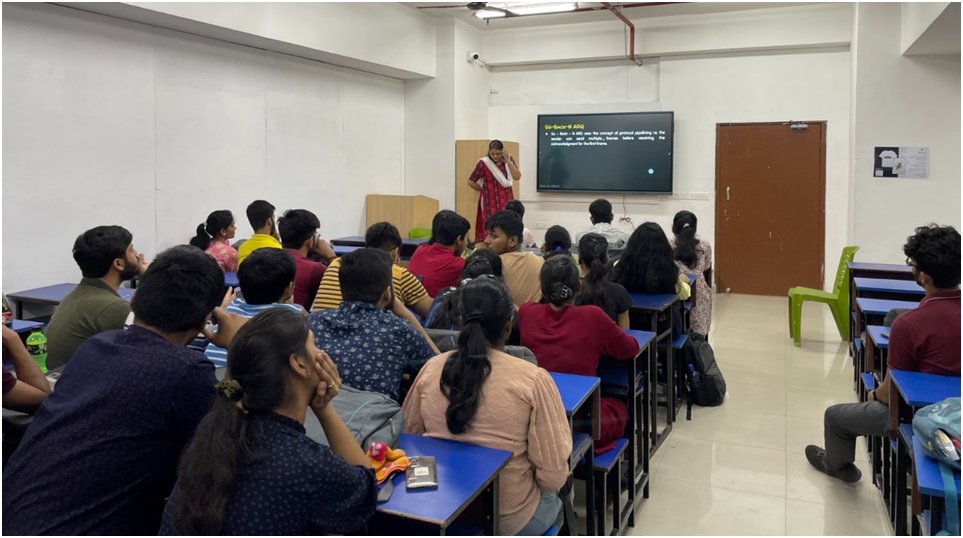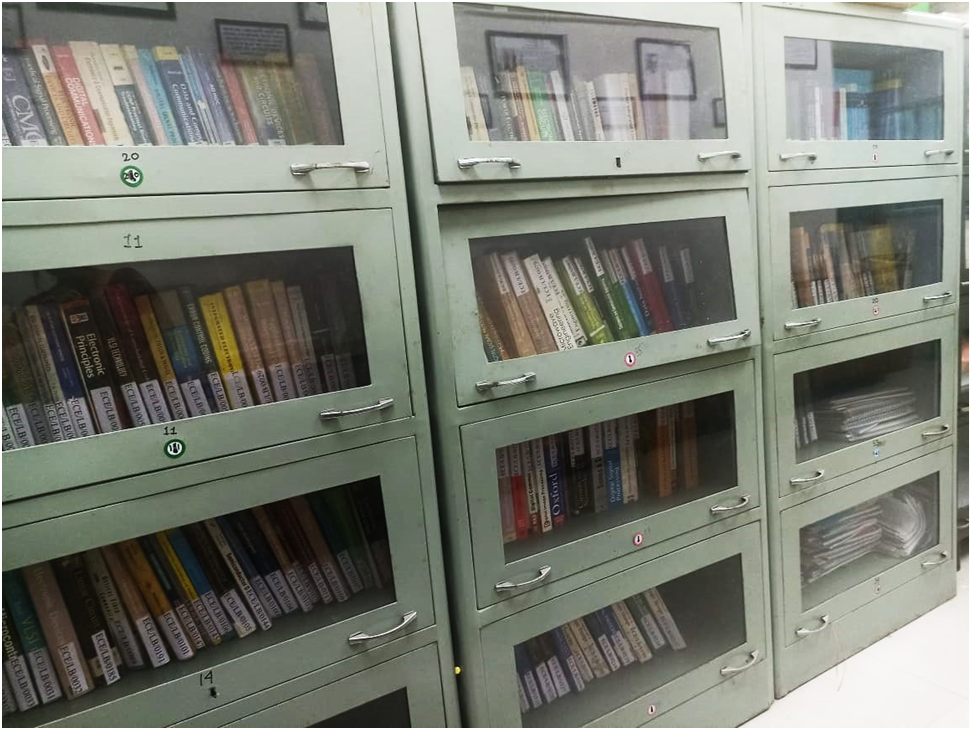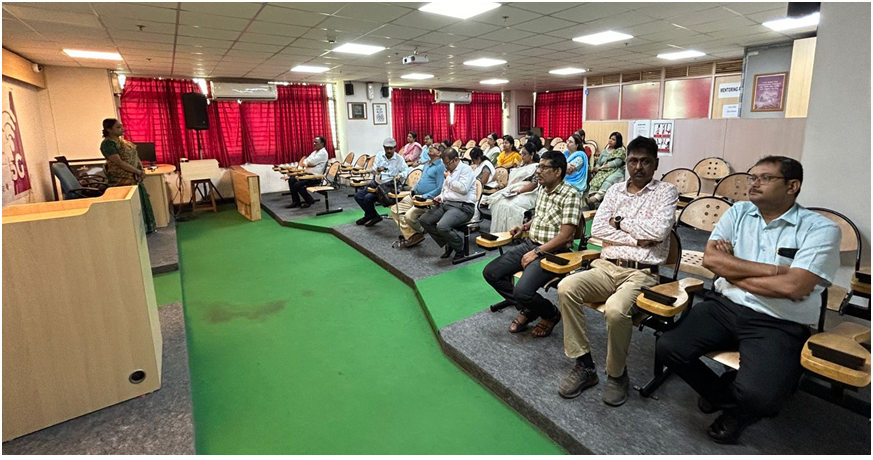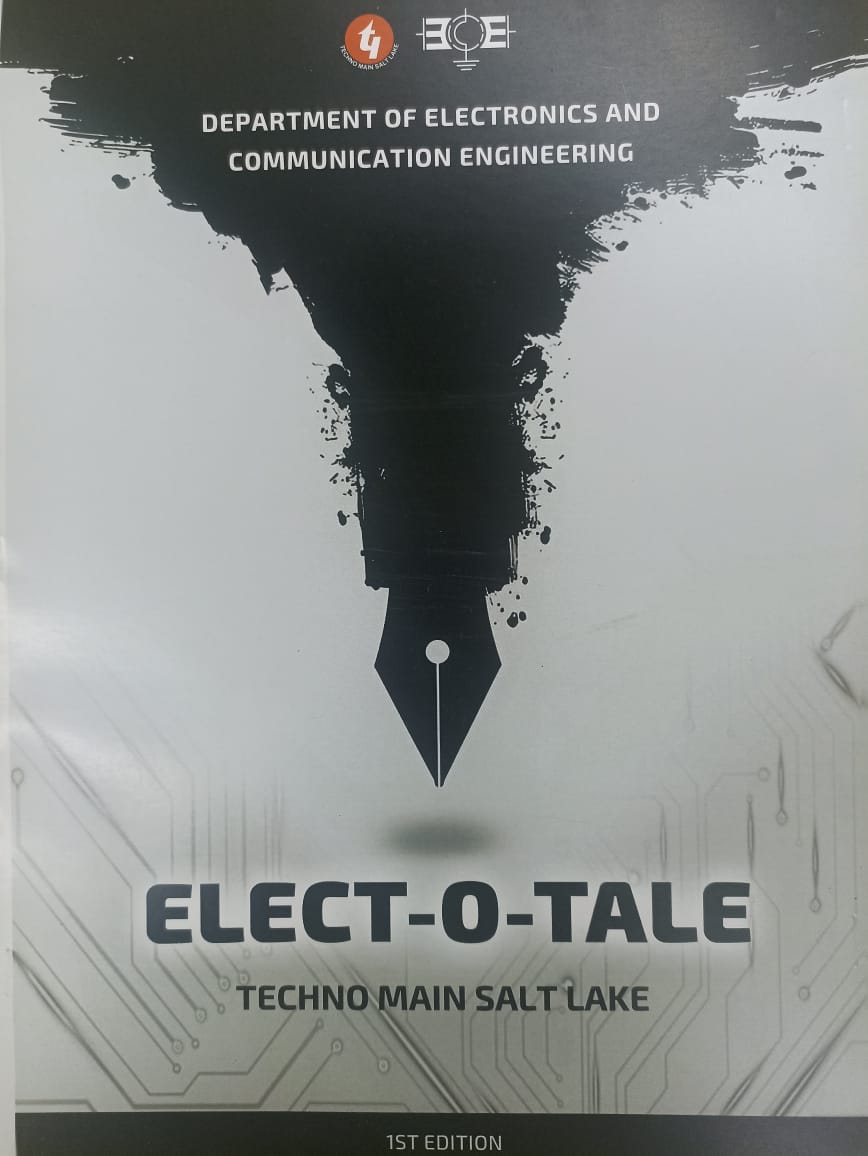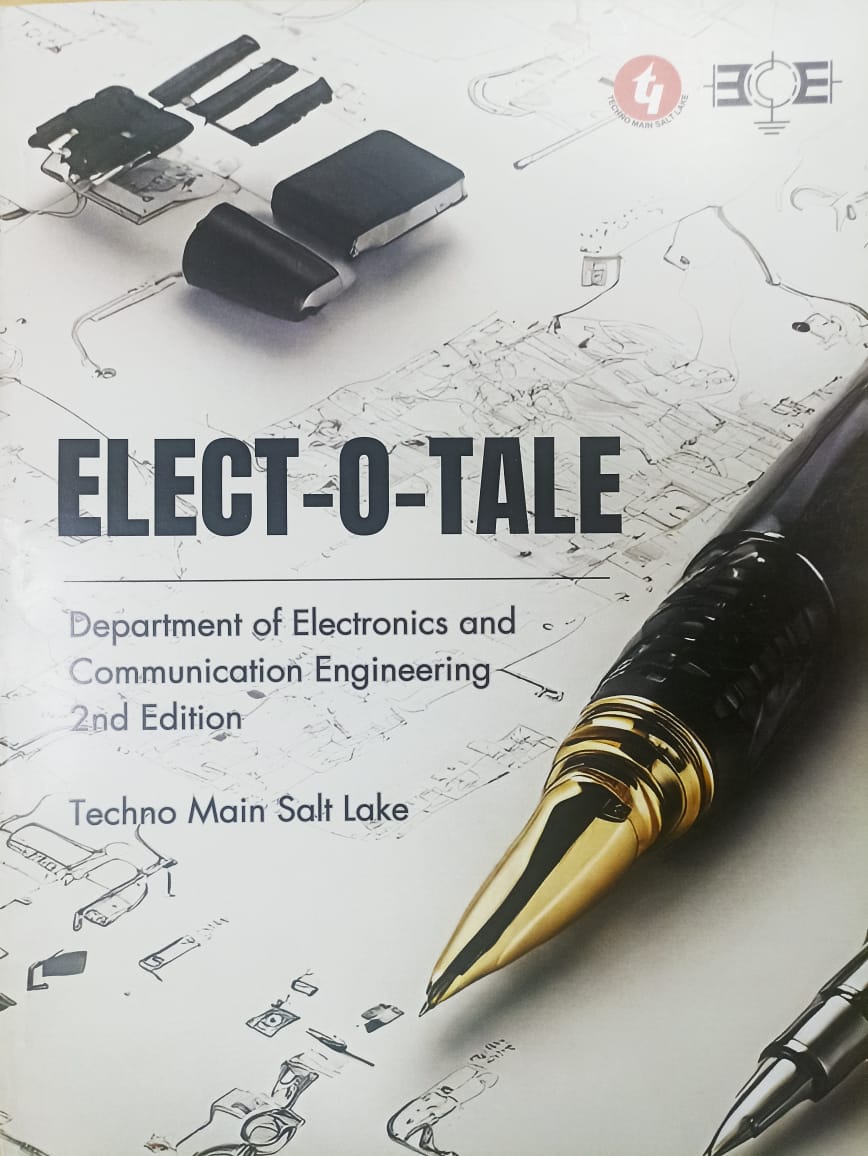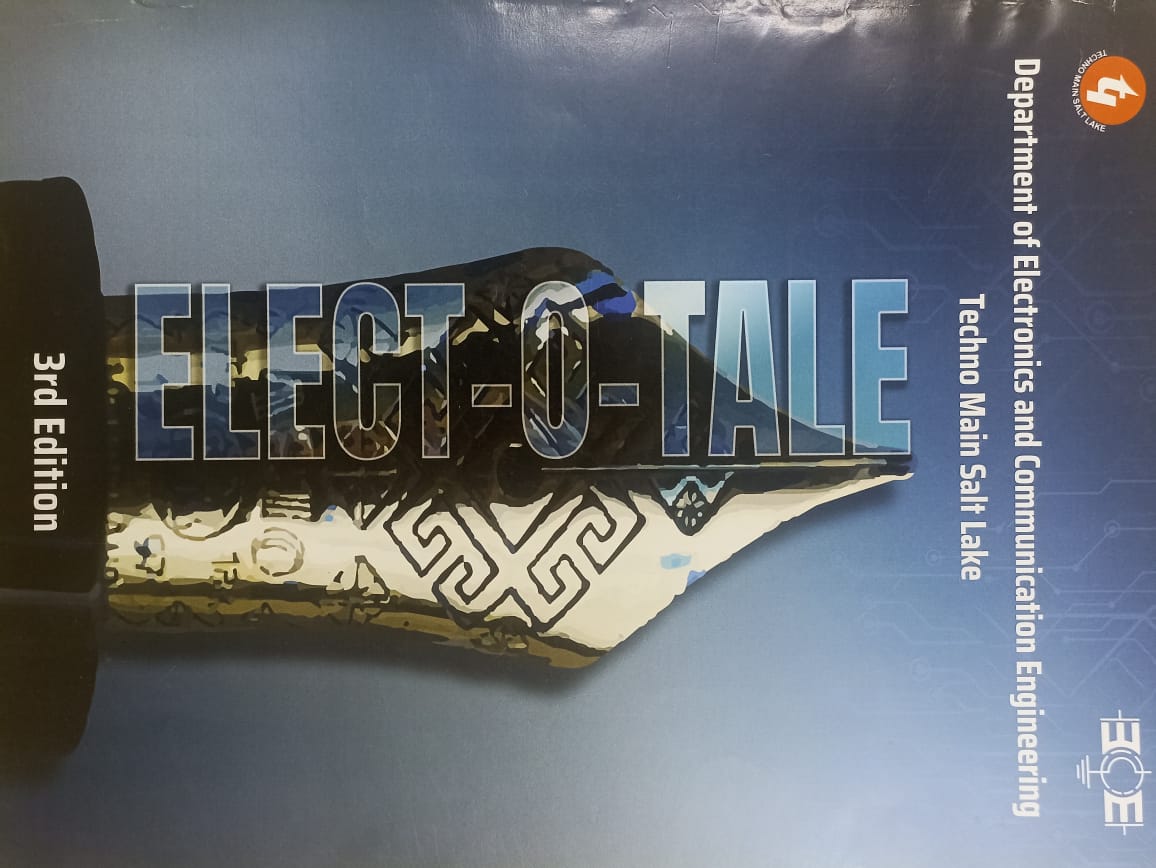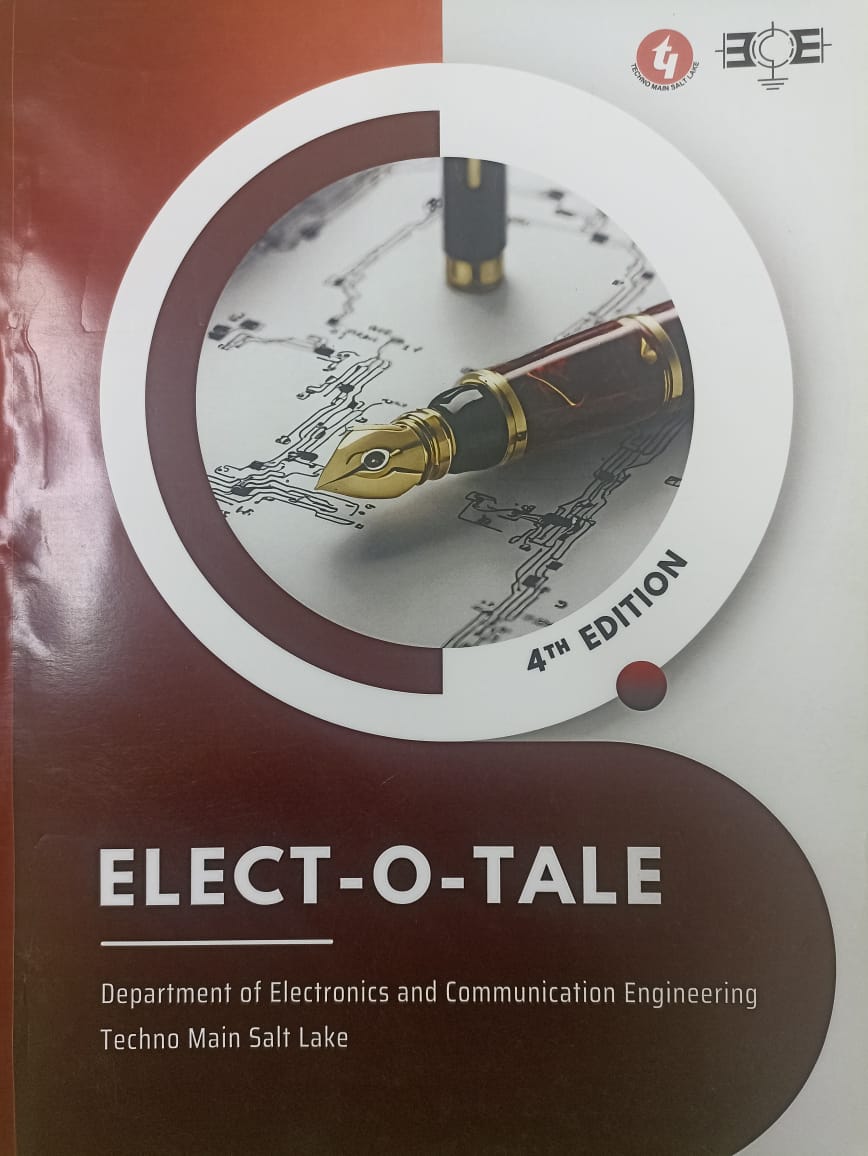Programming for Problem Solving Laboratory (ES-CS 291)
The objective of the laboratory is to develop coding skills following appropriate algorithms. Students in this lab learns the basic problemsolving skills using concepts like Arrays,Function, Strings, Pointers and Structures in C Programming environment. Special emphasis is given to correct syntax errors as reported by the compilers and logical errors encountered at run-time.
Major Equipment:Computers
Code Blocks open source software application that support compilers like C and C++
Electronic Device Laboratory (EC391)
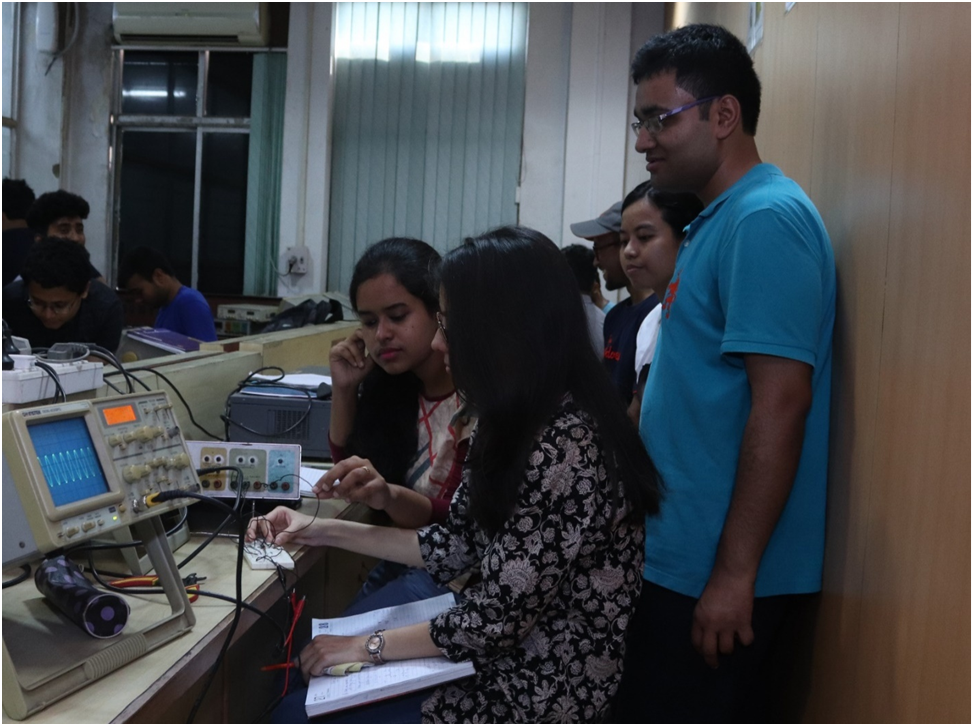 Students working at the Electronic Device Laboratory
Students working at the Electronic Device Laboratory
In this lab, students gain practical experience with various semiconductor devices, like diodes and transistors. Through guided experiments, they understand the behavior and characteristics of PN junction diodes, Zener diodes, Bipolar Junction Transistors (BJT), and Field-Effect Transistors (FET). In this lab, students learn the correct procedures for conducting these experiments, ensuring a deep understanding of the fundamental principles behind each device. This knowledge is essential for determining key parameters necessary for designing and optimizing electronic circuits.
Major Equipment:Function Generator
Regulated Power Supply
Cathode Ray Oscilloscope
Data Structure and Algorithm Laboratory (PCC CS391)
The Data Structure and Algorithm laboratory is a hands-on learning environment where students explore the fundamental concepts of data organization and manipulation. In this lab, students implement various data structures like arrays, linked lists, stacks, queues, trees, and apply algorithms for searching and sorting. Through practical exercises and projects, they gain proficiency in programming, problem-solving, and efficient resource utilization, which are crucial for software development and computational tasks. The lab fosters analytical thinking and prepares students to tackle complex challenges in Data Structure and Algorithm.
Major Equipment:Computer with relevant simulation software (code blocks)
Digital System Design Lab (EC392)
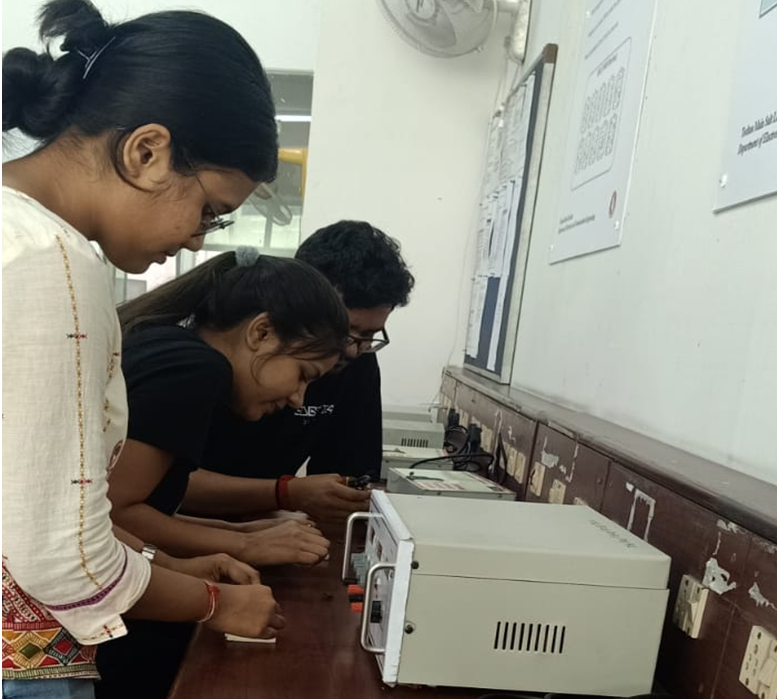 Students working at the Digital System Design Lab
Students working at the Digital System Design Lab
The lab introduces students to digital electronics and integrated circuit concepts. It covers topics such as logic gates, flip flops, counters, and code conversion. The lab is equipped with necessary tools and IC testers for implementing various circuits and experiments
Major Equipment:Power Supply
IC tester
Digital Multimeter
Pulse generator
Logic Probe
Xilinx Software
PSpice Circuit Simulator
Analog Communication (EC 491)
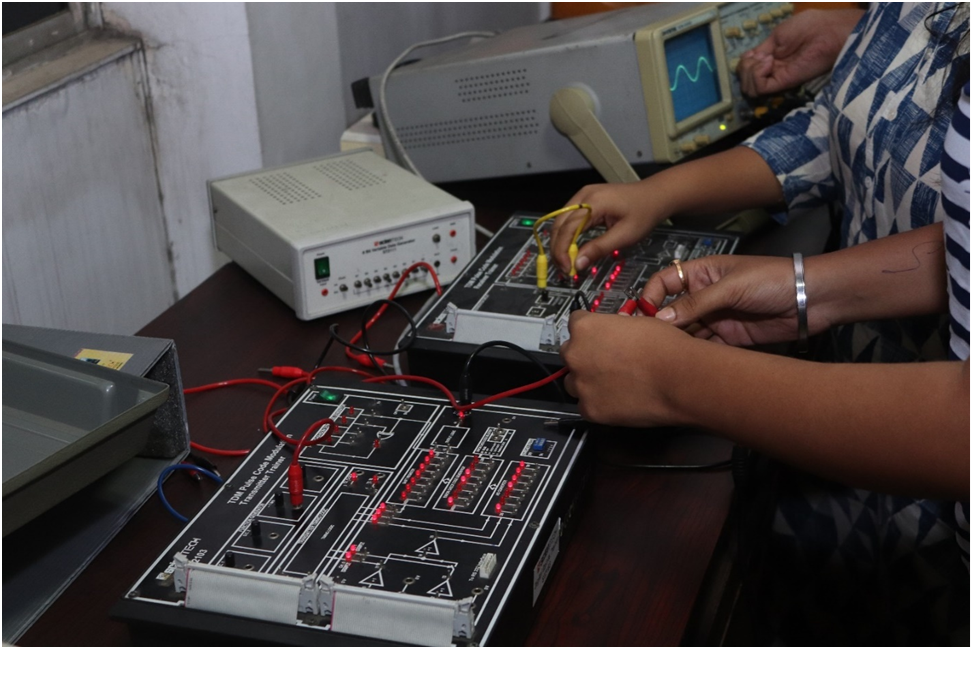 Students working at the Analog Communication Lab
Students working at the Analog Communication Lab
The lab offers practical experience in communication system components. It focuses on teaching amplitude and frequency modulation, including power modulation index relationships. Students learn to compare modulations based on bandwidth, advantages, and disadvantages. The lab also covers super heterodyne receiver and B/W TV experiments to familiarize students with modern communication systems.
Major Equipment:Programmable function Generator
Spectrum Analyzer
Automatic Distortion & level Meter
Digital Storage oscilloscope
Analog Communication Laboratory Trainer Kit
Analog Electronic Circuits Laboratory (EC 492)
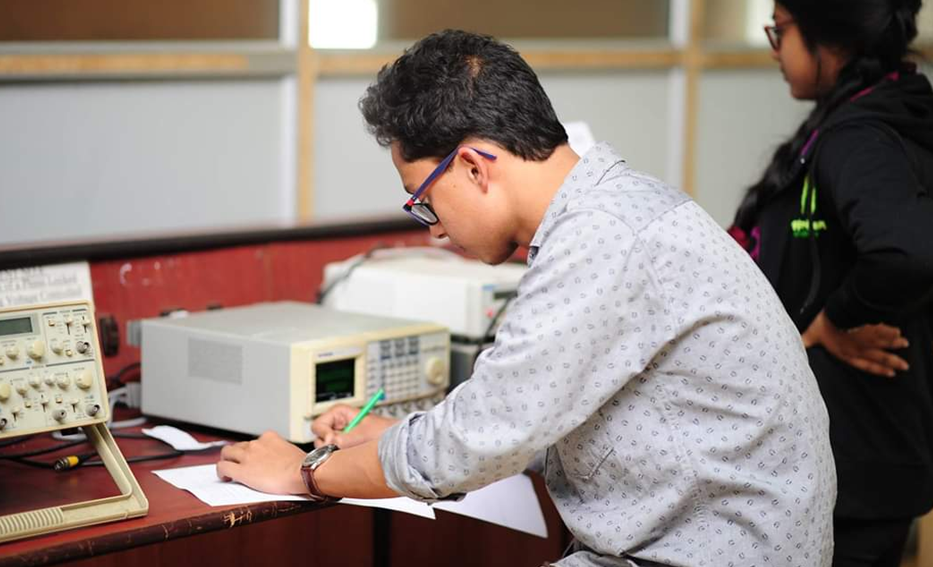 Students working at the Analog Electronic Circuits Laboratory
Students working at the Analog Electronic Circuits Laboratory
In this lab, students will explore the applications of different semiconductor devices like PN junction diodes, Zener diodes, BJT, FET etc. They also learn about the applications of general purpose and special purpose chips. In this lab, students learn how to construct circuits on a breadboard and are also introduced to some circuit design concepts
Major Equipment:Dual Channel Oscilloscope
Function Generator
Regulated Power Supply
Microprocessor and Microcontroller Laboratory (EC 493)
The lab focuses on teaching assembly language programming for 8085 microprocessors and 8051 microcontrollers. It helps students understand microprocessor concepts, develop programming skills, and work with real-time interfaces and peripherals for practical applications in both microprocessors and microcontrollers
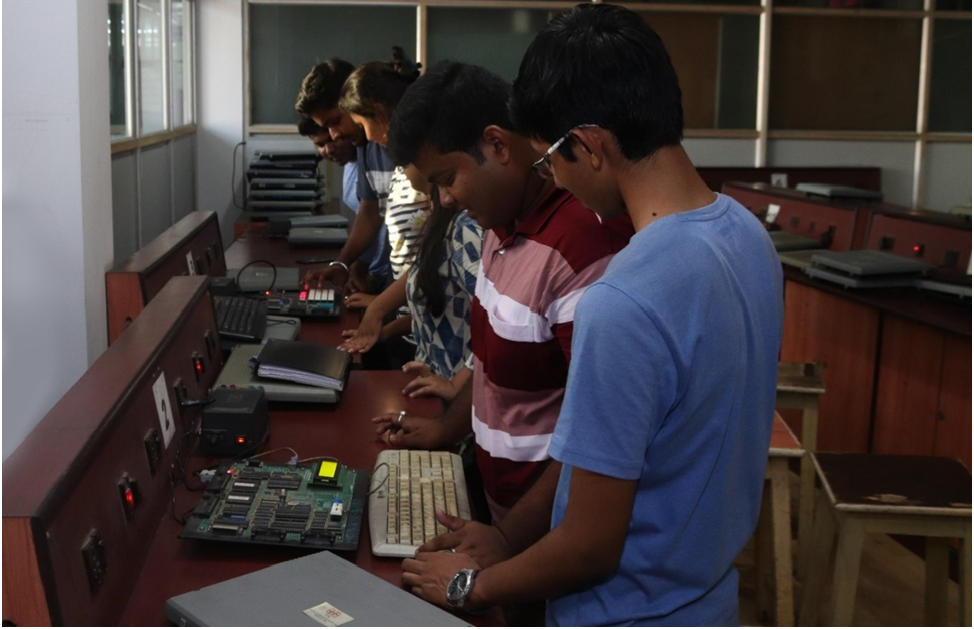 Students working at the Microprocessor and Microcontroller Laboratory
Students working at the Microprocessor and Microcontroller Laboratory
8085 based Microprocessor Trainer kit( Model ESA 85-2) Maker – ESA
8051 Family microcontroller trainer kit.( Model ESA 31 ) Maker – ESA
ESA Study Card for 8255
ESA, Stepper Motor Interface with Motor for 8255
ESA 8 channel 12 bit ADC
ESA Make Keyboard Interface
ESA Traffic light Interface
Computers
8085 SIMULATOR
Numerical Methods Laboratory (BS M491)
Numerical Methods Lab is a branch of mathematics that focuses on developing and implementing algorithms to obtain approximate solutions to complex mathematical problems. These methods are essential for solving equations and systems of equations that cannot be addressed analytically, such as integration, differentiation, and differential equations. Through iterative techniques and computer programming, these methods provide practical solutions to real-world problems, where exact solutions are either unknown or difficult to obtain.
Major Equipment:Computer with relevant simulation software (code blocks)
Soft Skill Development Laboratory (HS HU481)
The main objective of this lab is to encourage all round development of students by focusing on soft skill through individual and group activities. Here, students learn effective verbal / oral communications in group discussion / meeting / interviews, SWOT analysis, self-evaluation, and technical report writing. It enhances communication skills, listening skills, presentation skills and the leadership qualities of the students.
Major Equipment:Well-equipped English Laboratory
Electromagnetic Wave Laboratory (EC 591)
The Electromagnetic Wave laboratory provides hands-on experience with modern testing equipment. Students learn about Standing Wave Patterns in transmission lines, observe radiation patterns of various antennas. MATLAB is used for studying smith chart simulation of stub matching.
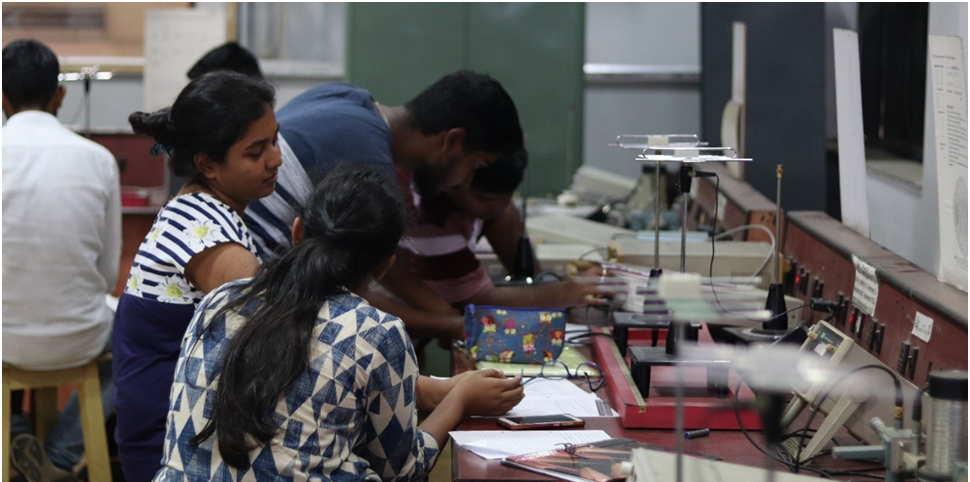 Students working at the Electromagnetic Wave Laboratory
Students working at the Electromagnetic Wave Laboratory
• Advance Antenna Trainer kit with following antennas
• 1. Simple dipole, Folded dipole
• 2. 3-element Yagi Uda
• 3. 5-element Yagi Uda
• 4. 7-element Yagi Uda
• PSpice and MATLAB
Digital Communication Laboratory (EC 592)
This laboratory course enriches the students with in-depth knowledge in digital communication systems at the practical level. This lab focuses the fundamental concepts on Pulse modulations, shift keying techniques, source coding techniques and Error-control coding techniques.
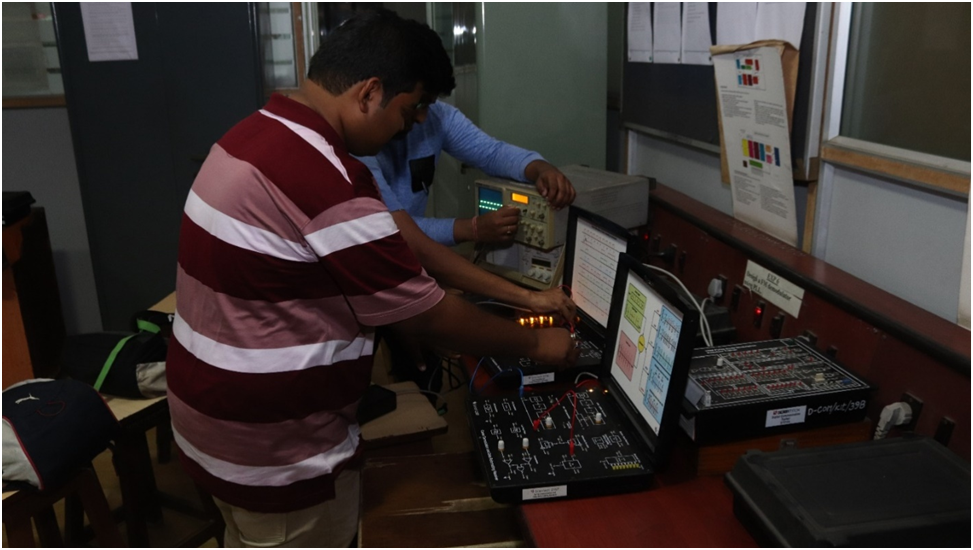 Students working at the Digital Communication Laboratory
Students working at the Digital Communication Laboratory
CDMA Direct Spread Spectrum Trainer
Programmable function Generator
Spectrum Analyzer
Digital Storage oscilloscope
PC based logic analyzer
Digital Communication Lab Trainer Kit
Digital Signal Processing Laboratory (EC593)
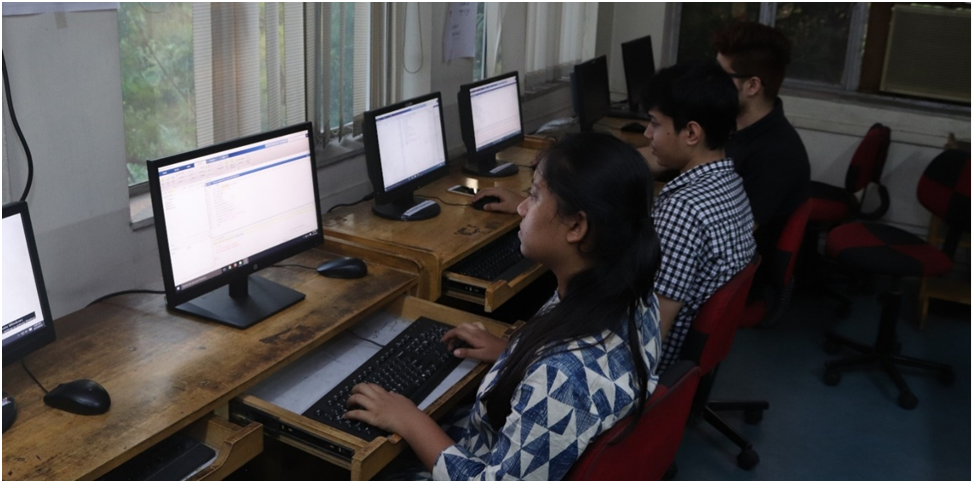 Students working at the Digital Signal Processing Laboratory
Students working at the Digital Signal Processing Laboratory
The Digital Signal Processing (DSP) Lab is an advanced learning environment where students explore the principles and applications of digital signal processing techniques. In this lab, students work with discrete-time signals and systems, implementing algorithms for filtering, transforming, and analyzing digital signals. They use software tools (MATLAB) and hardware platforms to design and test signal processing applications
Major Equipment:Computer with relevant simulation software(MATLAB)
Microtutor University Programme for DSP Lab Consisting of: Educational Practice Board for EPB
Control and Instrumentation Laboratory (EC 691)
The Control System Engineering Lab is a practical learning space where students apply theoretical concepts to real-world control systems. In this lab, students experiment with the design and implementation of controllers, such as PID controllers, to regulate the behavior of dynamic systems. They use software tools (MATLAB & PSPICE) and hardware setups to simulate and determine time response and frequency response on systems like second order low-pass Butterworth filter units. The lab emphasizes hands-on experience in mathematical modelling, stability analysis, and performance tuning, preparing students to develop efficient and reliable control solutions in various engineering applications.
Major Equipment:Computer with relevant simulation software(MATLAB& PSPICE)
Control Lab Trainer Kit
Computer Network Laboratory (EC 692)
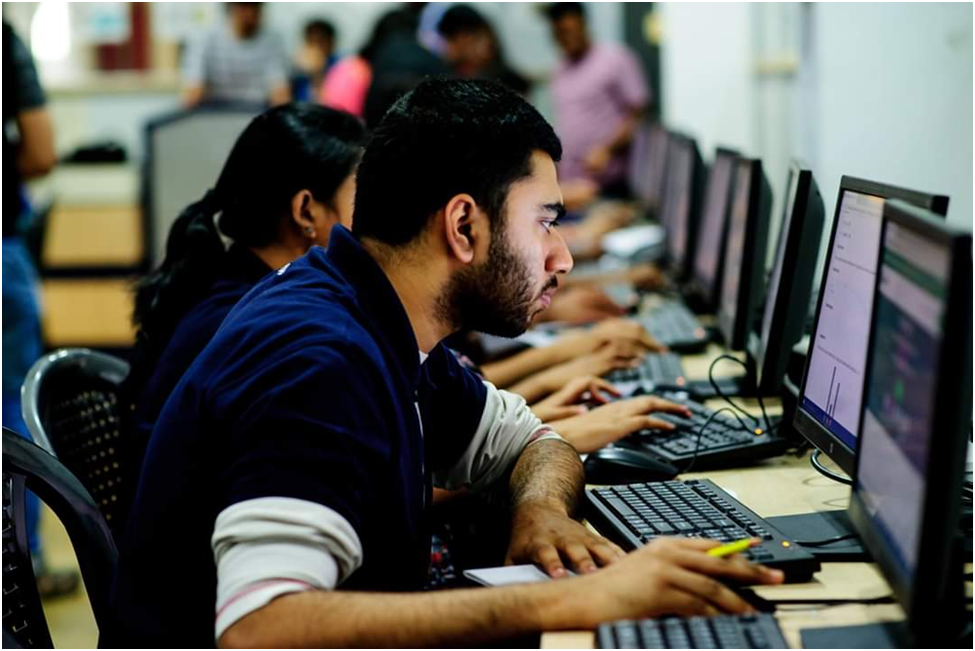 Students working at the Computer Network Laboratory
Students working at the Computer Network Laboratory
Computer Network Lab is a Linux environment lab where student apply the basic taxonomy and terminology of the computer networking and enumerate the layers of OSI model and TCP/IP model. They study fundamentals and basics of Physical layer, data link layer concepts, design issues, and protocols. Students can gain core knowledge of Network layer routing protocols and IP addressing with proper implementation. They study Transport layer services, and protocols including several variants with proper implementation. This lab gives an environment where studentsacquire knowledge and perform hands on of Application layer paradigms and protocols. Demonstration of physical connection of network devices using CAT5 / CAT6 cables, RJ-45 and T-Connector is being done in this laboratory.
Major Equipment:Computer with relevant O.S. (Ubuntu)
Mini Project / Electronic Design Workshop (EC 681)
Mini project is a team activity having 3-4 students in a team. It is electronic design workshop which offers hands-on learning experience to the students in electronics, analog and digital circuit design and implementation of various applications using software and hardware under the guidance of experienced teachers. In this lab / workshop students learn to execute different milestones of their project work starting from need analysis and literature survey, circuit design, simulation, component procurement, testing and troubleshooting, PCB design, report writing and finally demonstrate the project.
Major Equipment:DC Regulated Power Supply
Function Generator
Cathode Ray Oscilloscope
Digital Storage oscilloscope
Data Generator 6. Arduino Board
Project Laboratory (EC 782, EC 881)
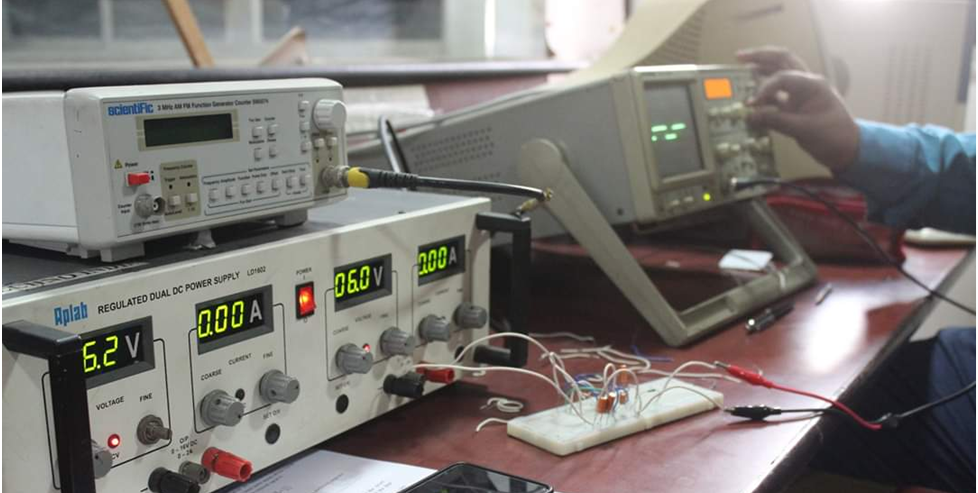
Students working at the Project Laboratory
Microelectronic Technology Laboratory
The objective of this laboratory involves both fabrication and characterization of microelectronic devices. The Box Coater unit helps to form metal-semiconductor contact by deposition of Aluminum on Silicon wafer by vacuum deposition technique. The rest of the experimental set up are used for characterization. One of them is for the study of Hall effect. The other instrument is used for the study of a P-N junction.
Major Equipment:Vacuum deposition Technique by HINDHIVAC Vacuum Box Coater, MODEL BC -300 (Hardware) with Water Chilling Plant
Experimental set-up for the study of P-N Junction. MODEL NO. PN-1 BY Scientific Equipment; (Hardware)
Experimental set-up to study Hall coefficient of a given material [Hall probe, OVEN and Thermocouple, Hall probe stand, Electromagnet, Constant current power supply, Digital Gauss Meter, CRO, Digital Gaussmeter: Model: DGM 102 (Hardware)]
Embedded system Laboratory
In this lab, students will be able to gain hands-on experience with VHDL (VHSIC Hardware Description Language) for designing any digital circuits and Verilogfor testing designed circuits followed by FPGA (Field Programmable Gate Array) technologies by implementing a variety of digital components and circuits. They will learn how to implement an Arithmetic Logic Unit (ALU) using VHDL, which will enable them to perform various arithmetic and logical operations. Students will also explore the implementation of both signed and unsigned multipliers using VHDL, understanding the differences and applications of each. Additionally, they will implement restoring and non-restoring dividers, which are essential for complex hardware designing.
Furthermore, the lab will introduce students to FPGAs, where they will familiarize themselves with the FPGA development board and tools. They will apply their VHDL knowledge to implement some combinational logic circuits, such as adders and multiplexers, as well as sequential logic circuits, including flip-flops, universal counters on the FPGA, by adjusting FPGA’s internal crystal oscillator frequency. Through these exercises, students will develop a deeper understanding of digital design, synthesis, and verification, preparing them for more advanced projects in digital electronics and embedded systems.
Major Equipment:1. FPGA Development Boards
VHDL Simulation and Synthesis Software (Xilinx Software Suite)
2. Computers with VHDL and FPGA Design Tools
VLSI Design Laboratory
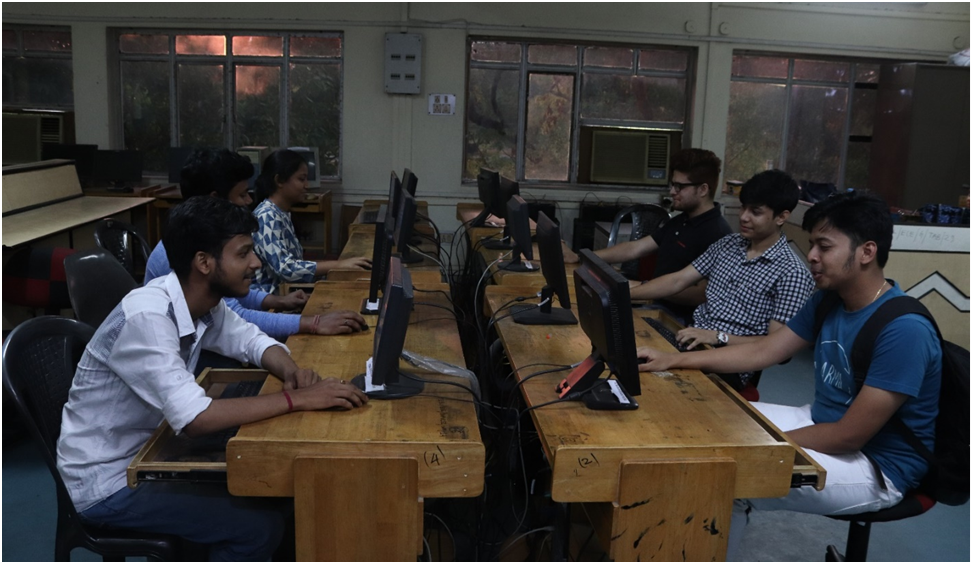 Students working at the VLSI Laboratory
Students working at the VLSI Laboratory
In this laboratory, the students will be able to learn the design, synthesis, and analysis of CMOS inverters and various other logic gates, including AND, NAND, and flip-flops, using Xilinx and other CAD tools. This course will provide comprehensive knowledge on creating efficient and effective digital circuits, enabling students to apply theoretical concepts in practical scenarios. They will gain hands-on experience with industry-standard software, which will enhance their understanding of digital design and prepare them for advanced applications in the field of electronics and integrated circuit design.
Major Equipment:VHDL Simulation and Synthesis Software (Xilinx Software Suite)
CAD Tools
Intel FPGA LAB
The concept of Reconfigurable Technology becomes extremely popular in Research Centre as well as academics. The department hosts an INTEL FPGA UAP lab for conducting practical experiments on FPGA Boards and Advanced Computer Architecture. This provides a comprehensive development platform to accelerate Reconfigurable Technology and technology with hardware development boards, software and system on Programmable Chip Development Tools Suite, embedded processors, on-board memory, a vast set of I/O pins, and a wide range of standard and research oriented Intel-FPGA intellectual property (IP). Configurable embedded processors aid to create a microprocessor-based system that is customized to match application requirements. The system generation tool automates the configuration and integration of IPs within a System on Programmable Chip. With an array of readily available IP cores, SOPC Builder enables the swift creation of a hardware system within minutes. Employing appropriate design software can significantly lower power consumption, enhance speed, and decrease compilation times in FPGA design.
IoT Laboratory
The IoT Laboratory within the department serves as a hub for innovation and education, providing students with hands-on experience to explore the vast potential of IoT technology across diverse domains. Equipped with state-of-the-art facilities, it aims to familiarize students with IoT principles and concepts, fostering creativity in addressing real-world challenges. The laboratory facilitates practical learning experiences, empowering students with skills in designing, prototyping, and implementing IoT solutions for applications such as healthcare, home automation, agriculture, and environmental monitoring. By emphasizing project-based learning and interdisciplinary collaboration, it aims to deepen students' understanding of sensor technologies, data analytics, programming, and hardware integration relevant to IoT. Additionally, students are encouraged to explore ethical, social, and security considerations associated with IoT deployment, enhancing their holistic understanding of the field and preparing them for careers in industries leveraging IoT technologies.
Industry Attached Laboratory
The department has established an Industry-Academia partnership with M/s Advance Mechanical Services Pvt. Ltd, Bengaluru, aimed at fostering industrial training, skill development, and professional growth of students in emerging fields such as Robotics Automation, Drone technology, and 3D Printing. The partnership's objectives include providing students with real-world industry experience, promoting technological innovation, and enhancing employment prospects by equipping them with relevant skills. This collaboration seeks to bridge the gap between academic learning and industry demands, enriching students' educational journey with practical insights and hands-on experience. Upon completion of the training, participants are expected to gain a comprehensive understanding of relevant technologies, design prototype models, and develop independent solutions to industrial problems. Overall, this partnership signifies a significant stride towards integrating practical experience with academic learning, preparing students for successful careers in evolving technological domains.


